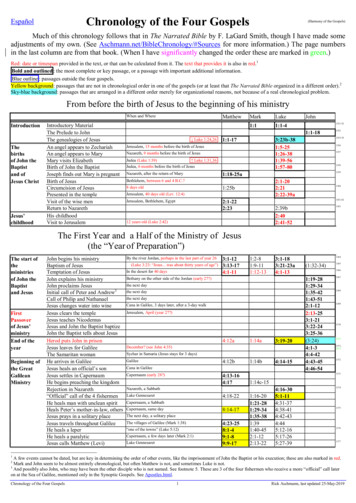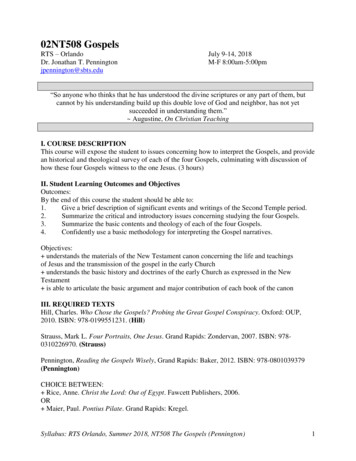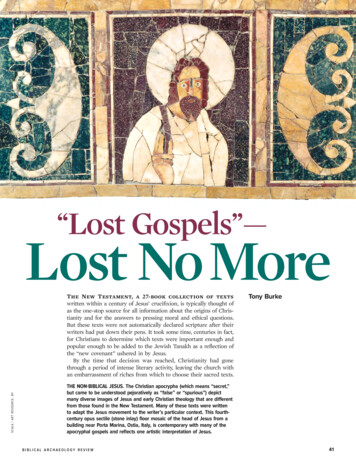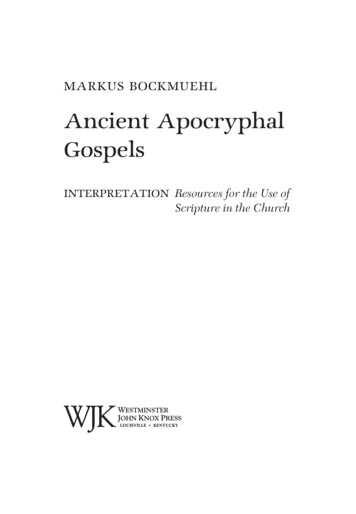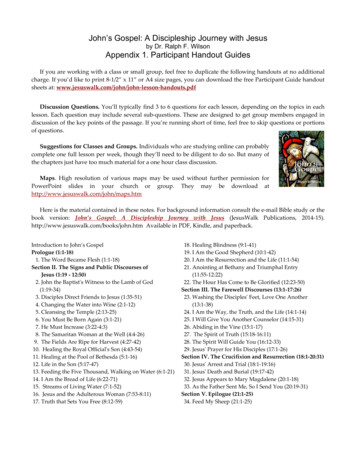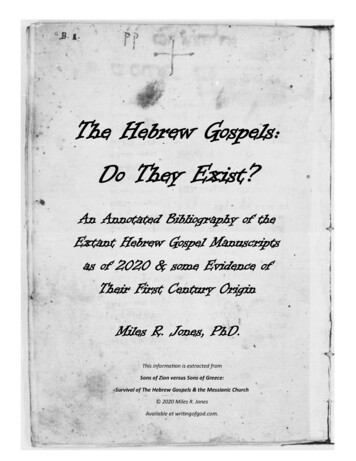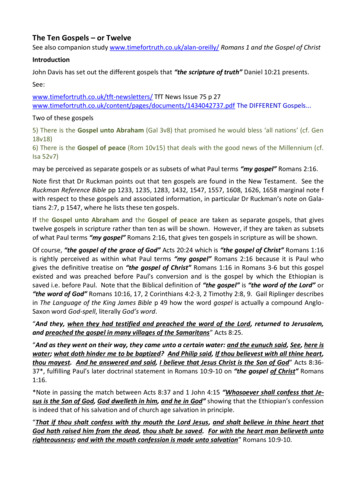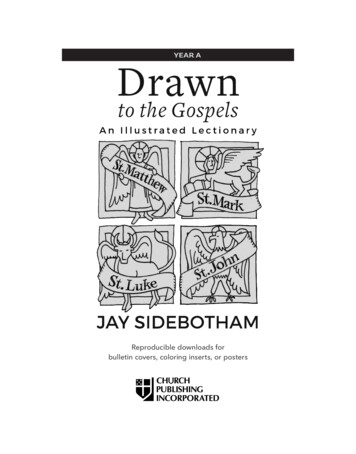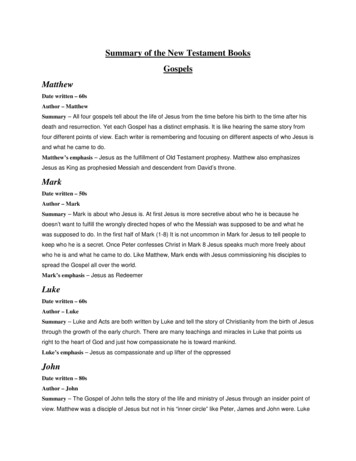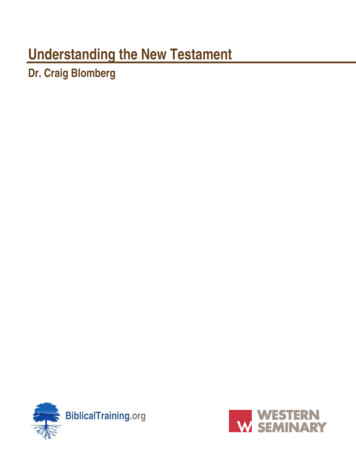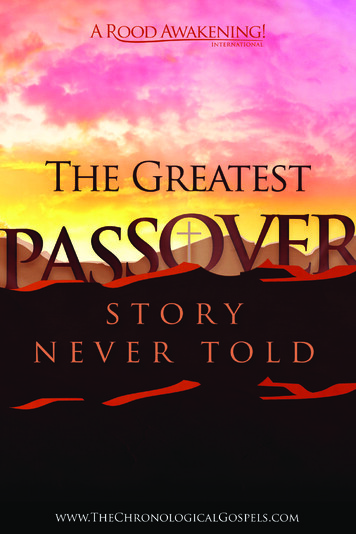
Transcription
The Chronological GospelsThe Life and Seventy Week Ministry of the MessiahThe Annotated Gospels Reconstructed in Chronological OrderMatthew, Mark, Luke, John, The Acts of the Apostles,and The Revelation of Yeshua Messiah
The Chronological GospelsThe Life and Seventy Week Ministry of the MessiahCopyright 2013 by Michael John RoodAll Rights Reserved. No part of this book may be reproduced or utilized in any form or byany means, electronic or mechanical, including but not limited to photocopying, recording, orby any information storage and retrieval system without the prior written permission of theauthor.Inquiries should be addressed to:Aviv Moon Publishing PO Box 1559Fort Mill, SC 29716www.TheChronologicalGospels.comLimited Leather Cover Manuscript Edition (200): September 2012/Tishri 6012Limited Hard Cover Manuscript Edition (1000): December 2012/Kislev 6012First Edition: August 2013/Av 6013All characters appearing in this work are real. Any resemblance to actual persons, living anddead, is purely based on truth. The Scripture in this book is the true, inspired Word of theCreator. In order to protect the accuracy of the content, names and identifying details have notbeen gentilized. Author and publisher do not assume and hereby disclaim any liability to anyparty for not heeding the instructions of the Almighty contained herein.Hard Cover Edition - ISBN-13: 978-0-9895281-0-8Soft Cover Edition - ISBN-13: 978-0-9895281-1-5Leather Cover Edition - ISBN-13: 978-0-9895281-2-2Large Print Edition - ISBN-13: 978-0-9895281-3-9Instructor’s Edition - ISBN-13: 978-0-9895281-4-6Printed in South Africa
PrefaceThe Chronological GospelsThe Life and Seventy Week Ministry of the MessiahThe Annotated Gospels Reconstructed in Chronological OrderMatthew, Mark, Luke, John, The Acts of the Apostles,andThe Revelation of Yeshua MessiahReconstructed and Annotatedby Michael John RoodThe four Gospel authors detail the five-fold ministry of the Messiah – that of theKing, the Servant, the Son of Man, the Son of God, and the Almighty Judge – eachwriter telling the story from his individually inspired perspective. Some of the eventsappear in more than one Gospel account; others appear only once; but it is thecombined details of all the Gospel records that accurately represent the life andministry of Yeshua of Nazareth (the Prophet of whom Moses prophesied) thepromised Messiah. In The Chronological Gospels: The Life and Seventy WeekMinistry of the Messiah, each of the first four Gospel portraits is superimposed overone another by precisely synchronizing them with the one miracle recorded by allfour Gospel authors – the feeding of the five thousand. This one common eventallows us to lock all four Gospel accounts into a singular moment in time thatoccurred in the middle of Yeshua’s ministry, making it possible to chronologicallyalign the events preceding and succeeding this propitious miracle.Every event recorded during Yeshua’s ministry is captured within the preciseframework of Yeshua going up to each of the Feasts of the LORD (Leviticus 23) andeither fulfilling the prophetic shadow pictures embedded within them or interpretingtheir future fulfillment (Colossians 2:16-17, Hebrews 10:1). Each of these Feasts wasreckoned according to the Creator’s lunar calendar, which was still in use for morethan 288 years after the destruction of the Temple and can now be accurately reversecalculated and synchronized with the Julian calendar system instituted more thanforty years before the birth of Yeshua. Until the restoration of the Creator’s originalcalendar was accomplished with the indispensable help of Sir Isaac Newton, theNational Aeronautic and Space Administration (NASA), Robert Scott Wadsworth,the Israeli New Moon Society, and Nehemia Gordon with the Israel Aviv SearchTeam, we were unable to piece together the Divine masterpiece that Heaven had beenbaiting us to discover. Knowledge has indeed “increased,” and men are now “runningto and fro” at speeds measured in nanoseconds (Daniel 12:4). We can finallyunderstand the things that were deliberately “sealed up” until the last days. Now the“leaven-free” Gospel of the Kingdom that Yeshua and his disciples taught can beunderstood with clarity and preached throughout the world with integrity.
PrefaceAfter forty years of labor, including three decades of restoring the Ancient BiblicalHebrew Calendar, together with the experiences that accompany years of living inJerusalem and the Galilee, I now present the inspired Gospel records in chronologicalorder to advance you in your lifetime quest for truth.The publication ofThe Chronological GospelsThe Life and Seventy Week Ministry of the MessiahWould not be possible if not for the indispensable help ofJudith Barbara RoodLeigh Rood FransenChaim H GoldmanSara Rood SmithDemerey MoorePhillip J BaconLinda D BaconRichard FikeJames R LouisRoberto UmanaNehemia GordonVerna Beth RoodBonnie Lynn HarveyRobert Scott WadsworthConstance Anne Elizabeth Tobiasand all those who gathered in our home in the Galileeevery Sabbath for five months as Jewish believers scrutinized every line ofThe Chronological Gospels – The Life and Seventy Week Ministry of the MessiahUnless otherwise noted, all Scriptures are fromthe Corrected King James Version (CKJV)Copyright Michael John RoodAviv 1, 6001 – March 26, 2001All rights reserved, Aviv Moon Publishing.No part of this work may be reproduced in any form or altered in any way withoutthe expressed written authorization from the publisher.All rights reserved in accordance with U.S. and International Copyright laws.
VII. Yeshua:thePassoverLamboftheFirstYear 180 Summary: preparations for PassoverPreparations began on the 9th day of the aviv and continued through the late afternoon of the 14th. Arented upstairs apartment in Jerusalem (upper room) was prepared for Passover and for their extendeddomicile through the feast of Shavuot. This parenthetical summary details where the last supper wouldtake place – not when the preparation was made. The night in which the last supper occurred was thelast evening in which leaven could be consumed. This is also the disciples’ first night in Jerusalem afterspending the previous week nights in Bethany on the Mount of Olives.Matthew 26:17-19MarkMark 14:12-1614:12At the beginning of thepreparations for Unleavened Bread, whenthey prepared to sacrifice the Passover,Yeshua’s disciples said to him, “Where willyou that we go and prepare that you may eatthe Passover?” 13He sent out two of hisdisciples after instructing them, “Go into thecity, and there you shall meet a man bearinga pitcher of water, follow him. 14Whereverhe goes in, say to the steward of the house,‘The master says, ‘Where is the guestchamber, where I shall eat the Passover withmy disciples?’ 15He will show you a largeupper room furnished and prepared, theremake it ready for us.” 16Then his disciplesLuke 22:7-13Johnwent forth, and came into the city, and foundas he had said to them, and they made readythe Passover.Matthew 26:17Now at the beginning of thepreparations for Unleavened Bread{1} thedisciples came to Yeshua, saying to him,“Where will you that we prepare for you toeat the Passover?” 18He said, “Go into thecity to such a man, and say to him, ‘TheRabbi says, My time is at hand! I will keepthe Passover at your house with mydisciples.’” 19The disciples did as Yeshuahad appointed them, and they made readythe Passover.{Mt 26:17.1} The KJV inaccurately translated the Greek text concerning “the protos of the Feast ofUnleavened Bread” as “the first day of the feast of Unleavened Bread.” The “first day of the feast” is the 15thday of the month of the Aviv (Nisan) – which would mean that they had already missed the Passover Seder.The protos – beginning of the preparations for Unleavened Bread – is the situation of which Yeshua spoke. Ittakes several days to prepare for the Passover Seder. The disciples were preparing for Passover at a rentedtownhouse in Jerusalem, rather than where they had been staying in Bethany. Bethany provided a measure ofsafety seclusion for Yeshua and his disciples during the week.Luke 22:7desire that we prepare?” 10Yeshua said,“Listen carefully, when you enter into thecity, you will meet a man bearing a pitcherof water. Follow him into the house that heenters 11and say to the steward of the house,As the time of Unleavened Breadapproached and the Passover must beprepared, 8Yeshua sent Kefa and Yochanansaying, “Go and prepare the Passover, thatwe may eat.” 9They asked, “Where do you221
VII.Yeshua:thePassoverLamboftheFirstYearto prepare for Passover.” 13The two discipleswent and found everything to be just as hehad told them, and they made ready thePassover.‘The master says, Where is the guestchamber where I may eat the Passover withmy disciples?’ 12He will show you a largefurnished upper room. That is where you are 181 The “Last Supper” before the Passover[14th Day of the 1st month, 4028 FC; Tuesday, April 27 after sunset, 28 CE]Week 63Day 438The timing of this meal is stated in John 13:1-2, but Yochanan detailed the things that took place afterthe evening meal was finished. John’s statement is brought to the front of the record to show the timingof this meal in relation to the upcoming Passover.MatthewJohnMarkLuke13:1Now before the Feast of thePassover, Yeshua knew that the hour wascome that he should depart out of this worldto the Father. He, having loved his ownJohn 13:1-2awhich were in the world, loved them to thevery end. 2And after [the last] supper hadended {1}{Jn.13:2.1} John’s narrative is cited here to show that the last supper, which is detailed in the followingnarrative, clearly occurs before the Passover.I. Yeshua and his disciples recline for dinnerthe evening before the crucifixion,which is also the night before the Passover is sacrificedMatthew 26:20Mark 14:17Luke 22:14-16Matthew 26:20JohnLuke 22:14Now when the even was come, hereclined{1} with the twelve [in the upperroom where they had been making Passoverpreparations].When the evening dinner hour wascome, he reclined with his twelve apostles.15He said to them, “With great desire I havedesired to eat this Passover with you before Isuffer, 16but I now tell you that I will notagain eat of the Passover until it is fulfilledin the Kingdom of hwhy.”{1}Mark 14:17That evening he came to the upperroom with the twelve [instead of returningto Bethany at the end of the day as they hadbeen doing all week long].{Mt. 26:20.1} KJV reads: “sat down.” They did not sit to eat, as they did in England in 1611; they reclined oncouches – the same ones they slept on in the rented townhouse room.{Lk 22:16.1} Yeshua will literally fulfill all of the prophetic shadow pictures embedded in the Passover in lessthan twenty-four hours. The rehearsal in the Temple was just a shadow of the fulfillment that was about tooccur in the Kingdom of hwhy as the Lamb of hwhy was about to be the substitution for the sins of the nation ofIsrael and the transgressions of the entire world.222
VII.Yeshua:thePassoverLamboftheFirstYearII. Yeshua interprets the rehearsal of Melchizedek’s bread and wineMatthew 26:26-29Mark 14:22-25Matthew 26:26As they were eating, Yeshua tookbread, blessed the Most High,{1} and brokethe bread, and gave it to the disciples, andsaid, “Take, eat; this is my body.” 27He tookthe cup and gave thanks again{1} and gave itto them, saying, “Drink all of it 28for this isthe renewed covenant in my blood, which isshed for many for the remission of sins.29But I say to you, from this day forward, Iwill not drink of the fruit of the vine, untilthe new day when I drink with you in myFather’s kingdom.”Luke 22:17-20Johngiven thanks, he gave it to them, and they alldrank of it. 24He said to them, “Thisrepresents my blood, shed for the renewingof the covenant, which is done for many.”Luke 22:17Yeshua took the cup, and gavethanks, and said, “Take this cup and divideit among yourselves, 18for I say to you, Iwill not drink of the fruit of the vine untilthe kingdom of hwhy shall come.”{1} 19Hetook bread, gave thanks, broke it, and gaveto them, saying, “This is my body which isgiven for you. Do this in remembrance ofme.” 20Likewise also the cup after supper,saying, “This cup represents the renewedcovenant{1} in my blood, which is shed foryou.”Mark 14:22As they ate, Yeshua took bread, andblessed hwhy, and broke it, and gave to them,and said, “Take, eat; this is my body.”23Then he took the cup, and when he had{Mt 26:26.1} Yeshua spoke the blessing with which the Melek Tzadek blessed the Most High when hebrought forth bread and wine to Avraham when he returned from the slaughter of the kings. This is the sameblessing that Avraham taught Yitzhak, who taught Yaakov, who taught his twelve sons, who still speak thisblessing every Shabbat over the bread: Baruch ata hwhy, eloheinu melek ha olam, ha motzi lechem min haaretz – Blessed are you hwhy, King of the universe, who brings forth bread from the earth. Yeshua thenexplained that this had always – even from the time of the Melek Tzadek – represented his body, which wouldbe the provision for our ultimate healing. Avraham had indeed seen Yeshua’s day in the representation of theshed blood and the broken body that the Melek Tzadek shared with him. Avraham rejoiced and laid a tenth ofhis vast wealth at the feet of the Priest of the Most High Elohim.{Mt 26:27.1} After the bread, Yeshua took the cup and blessed the Most High with the blessing that MelekTzadek blessed the Elohim of Avraham: Baruch ata hwhy, eloheinu melek ha olam, boray prie ha gaffen –Blessed are you hwhy, King of the universe, creator of the fruit of the vine. This represents the payment for thebroken blood covenant that we entered into at Mount Sinai. We broke the covenant, ratified with the blood ofbulls, and for that transgression, the guilty party must die. Yeshua, who never once violated that covenant,offered himself and died in our place. Through the substitutionary payment of the death penalty, which is thecurse for breaking the blood covenant, he can renew that covenant with us, write the Torah on our hearts, andactually live in us through the gift of the Holy Spirit (Jeremiah 31:31-34).{Lk 22:18.1} An important detail was recorded by Luke. Yeshua did not drink the wine that evening andprophetically proclaimed his abstinence until the marriage supper of the Lamb – an important part of thisremembrance.{Lk 22:20.1} The KJV inaccurately rendered this the new testament when this is a direct reference to theprophecy from Jeremiah 31:31-34, promising a renewed covenant. A testament and a covenant are twodifferent, legally defined entities. A new testament is a concept completely foreign to the Hebrew Scriptures. Asworn oath and a last will and testament are related to each other, and both of these can be found in theScriptures – but neither are related to the blood covenant that we entered into at Mount Sinai. The covenant,and the renewing of the covenant (of which Yeshua and Jeremiah refer) is of eternal significance. Israelentered into a blood covenant with the Almighty at Mount Sinai. Israel broke the blood covenant, therebyincurring the death penalty. The death penalty cannot be annulled – it must be paid. If one who never broke thecovenant died in the place of the guilty party, the covenant can be renewed with the guilty, but now justified223
VII.Yeshua:thePassoverLamboftheFirstYearparty. This is Yeshua’s point – and the meaning of this prophetic act of the bread and wine in the time of theMelek Tzadek, and the meaning of this memorial that Yeshua was instituting. The English term “newtestament” does not appear in “the New Testament” except where it is an inaccurate translation.III. During dinner Yeshua announces that one of them will betray himMatthew 26:21-25Mark 14:18-21Luke 22:21-23Matthew 26:21Johneats with me will betray me.” 19They beganto be sorrowful, and to say to him one byone, “Is it I?” and another said, “Is it I?”20He answered them, “It is one of the twelvethat dips with me in the dish. 21The Son ofMan will indeed depart this life, just as it iswritten of him; but woe to that man bywhom the Son of Man is betrayed! It wouldhave been better for that man never to havebeen born!”As they ate Yeshua said, “Truth Isay to you, one of you will betray me.”22They were exceeding sorrowful, and everyone of them began to say to him, “Master, isit I?” 23And he answered, “He that dips hishand with me in the dish, the same shall sellme. AHM{All of them were eating from onedish and, therefore, did not recognize him. Ifthey had known him, they would havedestroyed him.} 24The Son of Man will dothat which is written of him – but woe tothat man by whom the Son of Man isbetrayed! It would have been better for thatman if he had not been born!” 25ThenYehudas,{1} which betrayed him, quietlyasked, “Master, is it I?” He said to him,“You said it.”Luke 22:21“Behold, the hand of him thatbetrays me is with me at the table. 22Trulythe Son of Man will depart, as it has beendetermined; but woe to that man by whomhe is betrayed!” 23Then they began to inquireamong themselves, which of them it wasthat should do this thing.Mark 14:18As they reclined and ate, Yeshuasaid, “Truth I say to you, one of you which{Mt 26:25.1} There were two men named Yehudah at the supper table that evening: Yehudas Ben Shimonfrom Ascareyotah who betrayed Yeshua (John 13:26) and Yehudah the brother of Yaakov, also called bothLebbaeus and Thaddaeus in the KJV (Luke 6:16; Mark 3:18; John 14:22; Acts 1:13) who was also the writerof the book of Jude.IV. After dinner Yeshua washes his disciples’ feetto teach them the Kingdom servant’s attitudeMatthewMarkLuke 22:24-30Luke 22:24There was an argument among themconcerning which of them should beconsidered the greatest. 25Yeshua said tothem, “The kings of the gentiles exerciselordship over them, and those who exercisethat authority are bestowed with titles ofnobility. 26But it shall not be so among you!But he that is greatest among you, let him beas the younger; and he that desires to beexalted, let him become as a servant. 27TellJohn 13:1-22me, who is considered greater, he whoreclines at dinner, or he who serves? Is it nothe who reclines at dinner? But I have beenamong you as one who serves. 28You are thefew who have remained with me through allof my trials, 29and for that faithfulness I willaward a kingdom to you, just as my Fatherhas awarded the kingdom to me. 30One dayyou will eat and drink at my table in my224
VII.Yeshua:thePassoverLamboftheFirstYearAnd you are clean, but not all of you,” 11(forhe knew who should betray him – that iswhy he said, “You are not all clean.”)12After he had washed their feet and haddonned his garments, he reclined again andsaid to them, “Do you understand what Ihave done to you? 13You call me Rabbi andmaster, and you say well; for so I am. 14If Ithen, your Rabbi and master, have washedyour feet; you also ought to wash oneanother’s feet. 15I have just given you anexample, that you should do as I have doneto you. 16TRUTH, I say to you, the servantis not greater than his master; neither he thatis sent greater than he that sent him. 17If youknow these things, happy are you if you dothem. 18I speak not of you all. I know whomI have chosen but that the Scripture may befulfilled, ‘He that eats bread with me haslifted up his heel against me.’ 19Now I tellyou before it comes to pass, so that when itdoes come to pass, you will believe that I amthe One. 20TRUTH I say to you, he whoreceives whoever I send, receives me; andhe who receives me, receives the One whosent me.” 21When Yeshua had said this, hewas troubled in spirit, and he again testified,“TRUTH I say to you, one of you willbetray me.” 22Then the disciples looked oneon another, again wondering of whom hespoke.kingdom, and you will sit on thrones judgingthe twelve tribes of Yisrael.”John 13:1Before the Feast of the Passover,Yeshua knew that his hour was come that heshould depart out of this world to the Father,yet he loved his own which were in theworld to the very end. 2After [the last]supper had ended,{1} hasatan had already putenmity into the heart of Yehudas benShimon of Ascareyotah to betray him. 3ButYeshua knew that the Father had given allthings into his hands, and did not doubt thathe came from hwhy, and would go to hwhy.4So, he arose from supper, laid aside hisgarments, and took a towel to clothehimself. 5Then he poured water into a basinand began to wash the disciples’ feet and towipe them with the towel with which he wasclothed. 6When he came to Shimon, Kefasaid to him, “Master, are you going to washmy feet?” 7Yeshua answered, “You do notunderstand what I am doing now, but youwill understand later.” 8Kefa said to him,“You shall never wash my feet!” Yeshuaanswered him, “If I do not wash you, youwill have no future with me.” 9Shimon Kefasaid to him, “Master, wash not my feet only,but also my hands and my head.” 10Yeshuasaid to him, “He that is washed needs onlyto wash his feet and he is completely clean.{Jn 13:2.1} John’s narrative shows repeatedly that the last supper occurs the evening before the Passover. Thefollowing events occur during the last supper which, according to the Gospel narrative, occurs after sunset onTuesday, which is the beginning of the 14th day – exactly 24 hours BEFORE the Passover meal is eaten. Wecannot throw out the Scriptures which contradict our preconceived notions of what we want to believe aboutthe last supper. We can desire for Yeshua to be eating the Passover Seder with his disciples so that ourcomfortably held understandings can be maintained, but every one of the Gospel authors is giving an accurateaccount of the transpiring events, just as they were moved by the Ruach Kodesh. Only by treating eachaccount as a sacred viewpoint and then synchronizing these records with the whole of Scripture can we get theentire picture of the events surrounding the fulfillment of Passover as it was prophetically rehearsed from thetime we left Egypt through the second Temple period.225
VII.Yeshua:thePassoverLamboftheFirstYearV. After Yochanan is covertly shown the betrayer,Yehudas is sent on an unannounced errand –presumably to make last moment purchasesin preparation for Passover the following afternoon.The leavened bread and “leavened disciple”are removed from the upper room.MatthewMarkLukeJohn 13:23John 13:23-3530Now there was leaning on Yeshua’sbosom one of his disciples, whom Yeshualoved. 24Shimon Kefa, therefore, beckonedto him, that he should ask who it should beof whom he spoke. 25He then, lying onYeshua’s breast, said to him, “Master, whois it?” 26Yeshua answered, “He it is, towhom I will give a sop, when I have dippedit.” When Yeshua dipped the sop, he gave itto Yehudas from Ascareyotah, the son ofShimon, 27and after the sop, hasatan enteredinto Yehudas. Then Yeshua said to him,“That which you do, do quickly.”After having received the sop, he went outimmediately. It was night. [The day of thepreparation of the Passover sacrifice hadnow begun.]31When Yehudas had left the house, Yeshuasaid, “Now the Son of Man will be glorified,and hwhy will be glorified in him. 32If hwhy isglorified in him, hwhy shall also glorify theSon of Man in himself, and will soon glorifyhim. 33My dear children, I will only be withyou yet for a little while. You will seek me,but just as I said to the sages and Prushim,‘Where I go, you cannot come.’ Now I saythe same thing to you. 34I am also giving youa new commandment: love one another. Justas I have loved you, love one another. 35Bythis shall all men know that you are mydisciples – if you have love one foranother.”28Now no man at the table knew for whatintent he spoke this to him. 29For some ofthem thought, because Yehudas had the bag,that Yeshua had said to him, “Buy thosethings that we have need of before thefeast,” or that he should give something tothe poor [for their Passover provisions].VI. Yeshua’s “first warning” to Kefa that he would betray him"Three times before the crowing of the cock"MatthewMarkLuke 22:31-34John 13:36Luke 22:31Shimon Kefa said to him, “Master,where do you go?” Yeshua answered him,“Where I go, you can not follow me now,but you will follow me afterwards.” 37Kefasaid to him, “Master, why can I not followyou now? I will lay down my life for yoursake.” 38Yeshua answered him, “Will youlay down your life for my sake? TRUTH Isay to you, the cock shall not crow beforeyou have denied me three times.”John 13:36-38The master said, “Shimon! Look,hasatan has desired to have you, that he maysift you like wheat. 32But I have prayed foryou, that your faith does not fail. When youreturn from your sifting, strengthen yourbrothers.” 33Kefa said to him, “Master, I amready to go with you both into prison and todeath.” 34Yeshua warned, “I tell you, Kefa,the cock will not crow this day, before youwill deny three times that you know me.”226
VII.Yeshua:thePassoverLamboftheFirstYearVII. Yeshua instructs his disciples to purchase a sword immediatelyMatthewMarkLuke 22:35-38Luke 22:35Johnbuy one,{1} 37because I am telling you thatwhich is written, ‘He was reckoned amongthe transgressors,’{1} and this must still beaccomplished by me. There is a reason foreverything that is written concerning me.38They said, “Master, look; we have twoswords.” He said, “It is enough.”Yeshua asked them, “When I sentyou without a money purse, a bag ofprovisions, or extra sandals, did you lackanything?” They replied, “Not a thing!”36Then he said, “Now, whoever does nothave a sword, let him take his purse or hisbag of provisions, or even sell a garment and{Lk 22:36.1} If this were actually the Passover meal that occurs on the High Sabbath that commences theFeast of Unleavened Bread, there is no way that Yeshua would have told his disciples to go out and sell anarticle of clothing and buy themselves a sword that they would need (and use) later that night. Everymercantile in the nation would have been shut down and no one would be traveling for another twenty-fourhours if this were really the Passover Seder.{Lk 22:37.1} Isaiah 53:12VIII. Yeshua teaches his disciples around the dinner tableafter Yehudas leavesMatthewMarkLukeJohn 14:1“Let your heart not be troubled; youbelieve in hwhy, believe also in me. 2In myFather’s house are many apartments. If itwere not so, would I have told you that I amgoing to prepare a place for you? 3If I go andprepare a place for you, I will come againand receive you to myself, so that where Iam, there you may also be. 4You knowwhere I am going, and you know the way.”5Thomas said to him, “Master, we do notknow where you are going, so how can weknow the way?” 6Yeshua said to him, “I amthe way, the truth, and the life. No mancomes to the Father, but by me. 7If youknow me, you also know my Father. Fromnow on you must understand that you havealready known him, and you have seenhim.” 8Philip said to him, “Master, show usthe Father and it will satisfy us.” 9Yeshuasaid to him, “Have I been with you this longand yet you do not know me, Philip? Hewho has seen me has seen the Father! Howcan you say, ‘Show us the Father’? 10Do younot believe that I am in the Father, and thatthe Father is in me? The words that I speakto you I speak not of myself, but the FatherJohn 14:1-31athat dwells in me! He does the miraculousworks. 11Either believe me – that I am in theFather, and the Father in me – or elsebelieve because of the miraculous works thatyou have seen. 12TRUTH, I say to you, hewho believes on me, the works that I do, hewill do also; and greater works than these hewill do, because I go to my Father.13Whatever you ask the Father in my name,that I will do, that the Father may beglorified in the Son. 14If you shall askanything in my name, I will do it! 15If youlove me, keep my commandments.16“I will ask the Father, and he will give youanother comforter, who will abide with youforever – 17the Spirit of Truth – whom theworld cannot receive, because it can neithersee him nor know him. But you will knowhim, because he will dwell with you andshall be in you. 18No, I will not leave youcomfortless. I will come to you! 19In a littlewhile the world will see me no more, butyou will see me! Because I will live, youshall also live! 20In that day you will knowthat I am in my Father, and you are in me,227
VII.Yeshua:thePassoverLamboftheFirstYearand I am in you. 21He who has mycommandments, and keeps them, is one wholoves me. He who loves me shall be lovedby my Father, and I will love him, and I willmanifest myself to him.”bring all the things that I have spoken to youback to your remembrance.27“Peace I leave with you. My peace I giveto you – not the peace that the world gives,but I give you real peace. Do not let yourheart be troubled, neither let it be afraid.28You have heard how I said to you, ‘I amgoing away, but will come again to you.’ Ifyou really love me, you would rejoicebecause I said, ‘I am going to the Father,’because my Father is greater than I. 29Andnow I am telling you before it even comes topass, so that when it does come to pass, youmight believe. 30I will not speak with youafter this because the prince of this worldcomes. He has no claim against me, 31but sothat the world may know that I love theFather, I will do what the Father hascommanded me to do.”22Yehudah (not the one from Ascareyotah){1}said to him, “Master, how is it that you willmanifest yourself to us, and not to theworld?” 23Yeshua answered and said to him,“If a man loves me, he will keep my Torahand my Father will love him. We will cometo him, and make our abode in him. 24Hewho does not love me, does not keep myTorah. The Word which you hear mespeaking is not my word, but the Torah ofthe Father who sent me. 25These things haveI spoken to you, being still present with you.26But the Comforter, which is the gift of theRuach Kodesh, which the Father will send inmy name, will teach you all things, and will{Jn 14:22.1} This is the same Yehudah as in Acts 1:13
The Annotated Gospels Reconstructed in Chronological Order Matthew, Mark, Luke, John, The Acts of the Apostles, and The Revelation of Yeshua Messiah Reconstructed and Annotated by Michael John Rood The four Gospel
